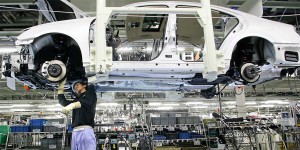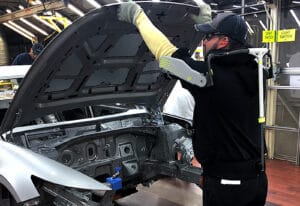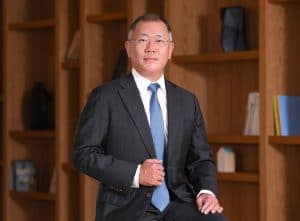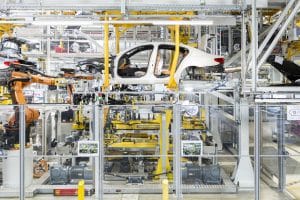
Despite the Hyundai Motor Group announcing Monday that it is “not in talks with Apple” at this point, TheDetroitBureau.com has learned the two sides could revive the lengthy negotiations aimed at having the South Korean carmaker produce an autonomous, all-electric vehicle for the tech giant.
Barely a week before the two companies were expected to announce a deal, Hyundai issued a regulatory report indicating that the discussions had been halted. The news immediately sent Hyundai’s share price tumbling sharply. Expectations of a deal previously boosted the company’s stock by as much as two-thirds once reports of a possible deal with Apple emerged at the beginning of the year.
“Hyundai Motor is not in talks with Apple on autonomous vehicle development,” the Korean automaker said in a regulatory filing on Monday. It added that “Hyundai Motor is getting requests from multiple companies for cooperation in joint development of autonomous, electric vehicles but nothing has been decided since it’s in early stage.”
Document language causes confusion

The language used in the filing could create some confusion as it leaves unclear exactly what had been happening between the two companies, and whether any discussions have been completely halted or simply put on hold.
The latter appears to be the case, according to several well-placed sources who are in a position to follow the talks between Hyundai and Apple which began about two years ago.
As recently as last week, South Korean media, citing industry analysts and unnamed company officials, were reporting that Apple would invest 4 trillion won, or about $3.6 billon, in Kia, the smaller of the brands making up the Hyundai Motor Group, or HMG. The plan, according to those reports, would be to produce about 100,000 autonomous, all-electric vehicles at the Kia assembly plant in West Point, Georgia, with longer-term goals of boosting that to as many as 400,000 vehicles annually.
But the unusual structure of HMG has created problems pulling a deal together, emphasized well-placed insiders.
Hyundai, South Korea’s largest automaker, essentially took over the smaller Kia following the country’s economic meltdown two decades ago. But there is a complicated business structure that means Hyundai doesn’t have complete control. And that has led to “jockeying” between the two brands to see which would come out on top if an Apple deal were to be completed, explained one insider, adding that there has been “a lot of back-and-forth” between the two that contributed to HMG’s decision to halt negotiations with Apple last Friday.
There are other challenges, TheDetroitBureau.com was advised. For one thing, the country’s powerful labor unions appear to be concerned about the plan to produce an Apple Car in the United States, rather than in HMG’s home market. South Korean unions have previously raised concerns about Hyundai’s expanding investment in global production, including factories in the U.S., the Czech Republic and China.

How good is the deal for Hyundai?
There are other concerns, insiders said, including the level of access Hyundai and Kia would get to the technology Apple plans to build into its vehicle, including the ability to drive autonomously. Eusin Chung, who became HMG chairman last October, has put a premium on such technology, Hyundai acquiring several companies it hopes will make it a serious contender in the emerging field of self-driving vehicles.
So, building a car for Apple without being able to get its technology for use in Hyundai and Kia products would diminish the value of any deal.
“From Hyundai’s perspective and Kia’s perspective, I mean, there could’ve been a bit of a conflict of interest,” Sung Yop Chung, regional head of automobiles and components at Daiwa Capital Markets, said during an interview with CNBC. “They don’t really want to just become a subcontractor of Apple, I think they were looking to sort of gain from Apple’s strong capabilities in software.”
The Silicon Valley giant has been exploring its automotive options for almost a decade and was, at one point, looking at going it alone as part of what was known internally as Project Titan. Several years ago, however, Apple largely wound down the program, releasing much of the program’s workforce or transferring them to other projects. But it was believed to be moving ahead with a sharper focus on autonomous driving technology.
“It makes sense for them to partner up with someone who has experience in building cars and has experience in the supply chain,” said Sam Abuelsamid, principal auto analyst with tech research firm Guidehouse, adding that a deal could offer benefits to Hyundai and Kia by increasing economies of scale. But that alone might not offset the negatives, such as brand dilution, said Abuelsamid.

While Hyundai may “not (be) in talks with Apple” at the moment, pressure from Chung could point back to the bargaining table, TheDetroitBureau.com was told. That said, if such a deal now is completely dead, Apple is not without options. There are other potential ways for it to get a car into production without setting up its own manufacturing base.
Apple has options: Magna
Canadian mega-supplier Magna International already serves as a contract manufacturer to a wide array of automakers using a flexible assembly plant in Graz, Austria. If anything, Magna has signaled interest in expanding its operations, announcing late last year a deal with EV automaker Fisker. That startup will use a platform developed by Magna as the underpinnings of the Fisker Ocean SUV set to go into production in 2022.
Magna has indicated it would like to set up similar arrangements with other nascent EV makers, the supplier also confirming it would be willing to build a second contract assembly plant in the U.S. if there was a viable economic plan.
Apple also could turn to longtime partner Foxconn, the assembler of iPhones and other Apple devices. The company last year announced a strategy similar to Magna’s, developing a flexible EV platform that it could assemble on a contract basis at a new assembly plant in China.







